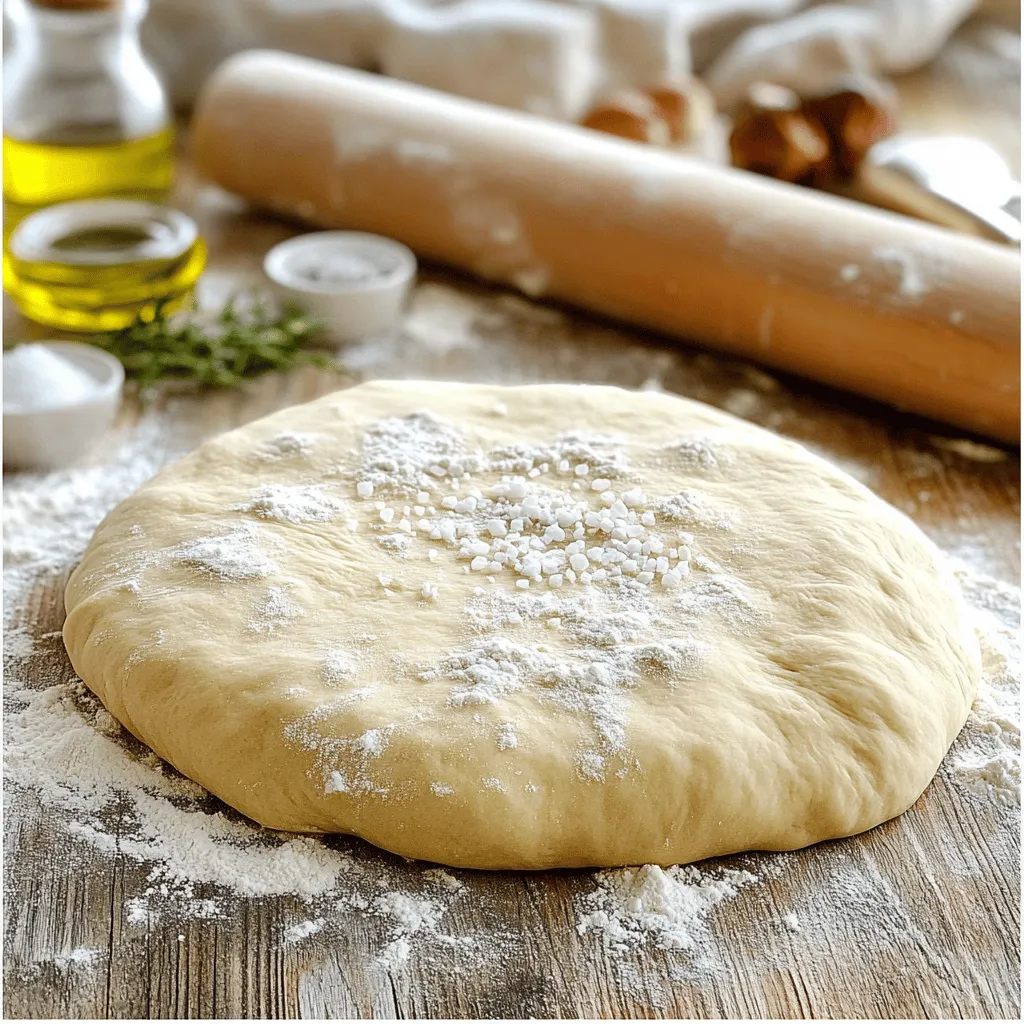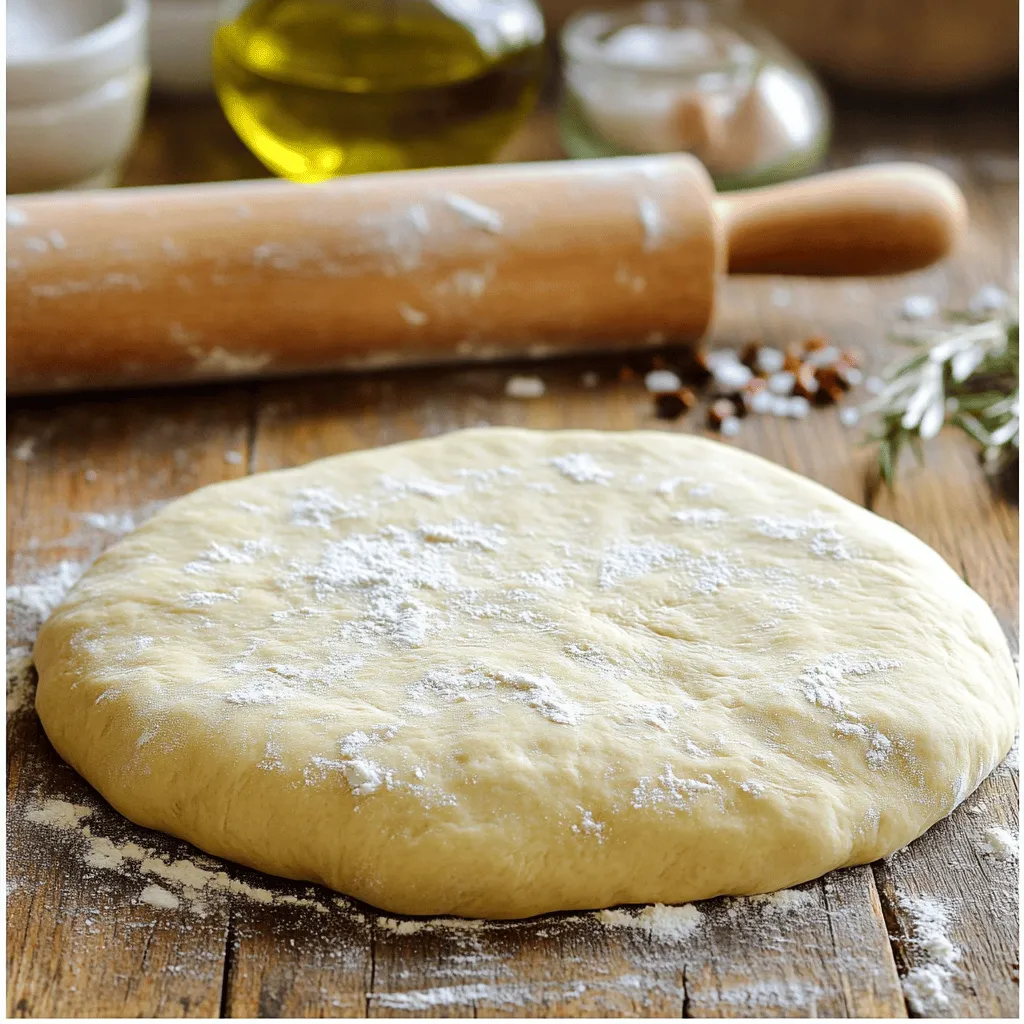Looking to make the perfect homemade pizza dough? You’re in the right place! This simple and flavorful recipe guides you through each step, from choosing the right ingredients to troubleshooting common issues. Whether you’re a beginner or an experienced cook, my easy tips will help you create delicious dough every time. Let’s dive in and transform your kitchen into a pizzeria!
Ingredients
List of Ingredients
– 4 cups all-purpose flour
– 1 ½ cups warm water
– 2 tablespoons olive oil
– 2 teaspoons sugar
– 2 teaspoons salt
– 2 ¼ teaspoons active dry yeast
Ingredient Substitutions
You can swap all-purpose flour for gluten-free flour. Brands like Bob’s Red Mill work well. If you prefer whole grains, use whole wheat flour. This adds fiber and a nutty flavor. For oils, feel free to use canola or avocado oil if you want. Each oil gives a slightly different taste.
Importance of Fresh Ingredients
Using high-quality flour is key. Fresh flour has better taste and texture. When buying flour, check for freshness dates. Benefits of fresh yeast are huge too. Fresh yeast makes the dough rise better. It gives a nice, airy texture. If you can, buy yeast from a reliable source. This ensures you get the best results.
Step-by-Step Instructions
Preparation of Yeast
To start, we need to activate the yeast. This step is key for making our dough rise. In a small bowl, mix warm water, sugar, and active dry yeast. Let this sit for 5-10 minutes. If the mixture gets frothy, your yeast is ready to use.
Water temperature matters a lot here. Use water that is warm but not too hot. The best range is around 110°F. If water is too hot, it can kill the yeast. If it’s too cold, the yeast won’t activate.
Mixing the Dough
Next, we mix our ingredients. In a large bowl, combine the flour and salt. Stir well to blend them. Create a well in the center of this mixture. Pour in the activated yeast and olive oil.
When you mix, use a wooden spoon. Stir until a dough starts to form. Make sure to combine all the flour from the bowl. You want no dry bits left behind.
Kneading and Rising
Now it’s time to knead the dough. Transfer it to a lightly floured surface. Knead for about 8-10 minutes. Press, fold, and stretch the dough until it’s smooth and elastic. This builds the dough’s strength.
For rising, place the kneaded dough in a greased bowl. Cover it with a damp cloth or plastic wrap. Let it rise in a warm spot for about 1 hour. You know it’s ready when it has doubled in size. This process is vital for a light and airy crust.
Tips & Tricks
Achieving the Right Consistency
To get the perfect dough, mix until it feels smooth and elastic. You should see some bubbles. If the dough is sticky, add a little more flour. If it is too dry, add a bit of water. Humidity can change how much flour you need. At high altitude, you may need more water or less flour.
Common Troubleshooting Issues
If your dough feels too sticky, add flour a tablespoon at a time. Knead it well after each addition. For dry dough, mix in a teaspoon of warm water. Let it rest for a few minutes, then knead again. Don’t be afraid to adjust based on how it feels.
Enhancing Flavor
Add herbs like oregano or basil to the dough for extra taste. You can mix in garlic powder or even cheese for a twist. For a richer flavor, let the dough ferment longer. After mixing, cover it and let it sit in the fridge overnight. This will boost the taste and give your pizza a special kick.

Variations
Gluten-Free Pizza Dough
To make gluten-free pizza dough, you need different ingredients. Use gluten-free flour blends instead of all-purpose flour. Here’s what you will need:
– 4 cups gluten-free flour blend
– 1 ½ cups warm water
– 2 tablespoons olive oil
– 2 teaspoons sugar
– 2 teaspoons salt
– 2 ¼ teaspoons active dry yeast
You must adjust the rising time. Gluten-free dough often needs more time to rise. Let it sit for 1 to 1.5 hours in a warm spot. This helps the dough become airy and soft.
Whole Wheat Pizza Dough
Whole wheat pizza dough is a healthy choice. It adds fiber and nutrients to your meal. Here are the benefits of using whole wheat:
– Higher fiber content
– More vitamins and minerals
– A nuttier flavor
To modify the texture, mix half whole wheat flour and half all-purpose flour. This gives you the benefits of whole wheat while keeping it soft. You may need to add a bit more water. Whole wheat flour absorbs more liquid.
Flavor Variations
You can easily add flavor to your pizza dough. One fun method is to make garlic-infused dough. Simply add 2-3 cloves of minced garlic to the olive oil before mixing it in. This adds a great taste to your crust.
If you love cheese, try a cheese-stuffed crust. After rolling out your dough, add mozzarella cheese along the edge. Fold the dough over the cheese and seal it. This way, you get a cheesy surprise with every bite!
Storage Info
Storing Unused Dough
To store unused dough, place it in a bowl. Cover it with plastic wrap or a damp cloth. This keeps the dough from drying out. Store in the fridge for up to three days. If you want to keep it longer, freeze it. Wrap the dough tightly in plastic wrap and then place it in a freezer bag. Frozen dough lasts for about three months.
How to Revive Dormant Dough
If your dough is frozen, start by thawing it. Remove it from the freezer and let it sit at room temperature for a few hours. Once thawed, reseal the dough in a bowl. For best results, let it rest for 30 minutes. If the dough seems inactive, you can re-activate the yeast. Mix a little warm water with sugar and add it to the dough. Let it sit for about 10 minutes until it bubbles.
Leftover Pizza Dough Recipes
Don’t waste extra dough! You can make breadsticks by rolling out the dough and cutting it into strips. Brush with garlic butter for extra taste. You can also create mini calzones by filling the dough with cheese and veggies. Another fun idea is to make pizza rolls. Roll the dough, add toppings, and bake until golden. These options are tasty and simple!
FAQs
How long does homemade pizza dough last?
Homemade pizza dough lasts about 3 to 5 days in the fridge. Store it in an airtight container. Check for signs of spoilage before use. Mold is the most obvious sign. If it smells sour or off, toss it.
Can I make pizza dough ahead of time?
Yes, you can make pizza dough ahead of time. Prepare it and let it rise. After the first rise, wrap it tightly and store it in the fridge. For the best flavor, let it rest overnight.
What temperature should the dough rise?
The dough should rise in a warm place, around 75°F to 80°F. This temperature helps yeast grow. If your kitchen is cool, try placing the dough near a warm oven. The rising time may increase if it’s colder.
Making pizza dough is simple with the right ingredients and steps. Start with basic ingredients like flour, water, and yeast. Fresh ingredients make a big difference in taste and texture. Follow the steps to prepare, mix, knead, and rise the dough correctly. Try variations for gluten-free or whole wheat options. Store any unused dough properly for future meals. With these tips, you can create delicious pizza at home and impress your family and friends. Enjoy your pizza-making journey!




